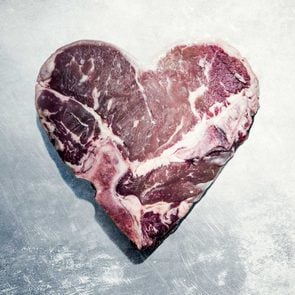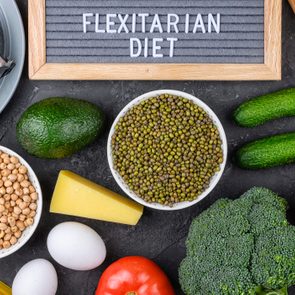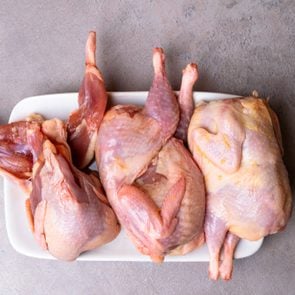Are You an Aspiring “Reducetarian”? These Are the 5 Smart Grocery Swaps You’ve Got to Try
Updated: May 24, 2023
For a lot of us, it's not quite practical to swear off meat forever. If that's the case, this writer—a vegan athlete and dad of two—shares his favorite smart and simple swaps for your next grocery haul. (You can even place your order right here.)
Our editors and experts handpick every product we feature. We may earn a commission from your purchases.
What is reducetarianism?
You’ve heard that eating more plants, and less meat, is one of the best things you can do for the planet (and your health). But when you’ve got loved ones to feed, giving up meat cold turkey can feel like a lifestyle change that’s just not worth the fight.
If you’ve found yourself in that scenario, figuring out the right thing to do can be tough. Even though most of us now understand that consuming too much meat—which can increase the risk of deficiency in nutrients from fruits, vegetables, and whole grains—is associated with disorders like heart disease, colon cancer, and obesity, global research shows that meat consumption has increased every year over the past two decades-plus.
Fortunately, experts on plant-based eating recognize that it’s not quite practical for all of us to swear off meat forever. In response, some are coming up with healthy solutions that fit your life.
Sustainable Meat: The Best and Worst Kinds, Ranked by Sustainability Experts
One of those thought leaders is Brian Kateman, the producer of the documentary Meat Me Halfway and author of the April 2022 book of the same title. In 2014, Kateman founded the Reducetarian Foundation, which encourages people to eat mostly plant-based foods while allowing animal products in moderation. As he tells The Healthy, “Many people think of meat consumption as an all-or-nothing premise: either you’re a vegan, or you’re not.” But, he continues, “This is quite problematic because the vast majority of people don’t want to go vegan. Don’t let perfection be the enemy of the good.”
Research from 2019 backs up Kateman’s point, suggesting that the most effective way to get people to change a major lifestyle habit, such as reducing their animal consumption, isn’t to bombard them with information or make them feel guilty or worried about their dietary choices. A meaningful way to change minds is to be supportive and provide education, while encouraging audiences to make relatively small changes in their behavior over time.
Meaning? When it comes to eating less meat, it’s OK to lose the all-or-nothing mindset and focus on simply doing your best to eat healthy, whole plant foods, while limiting animal products when possible.
That starts with your grocery list—next time you’re at the supermarket, consider making the simple and healthy food swaps below. You’ll feel better all around.
10 Easy Tweaks to Eat More Sustainably
What is a “reducetarian”?

A reducetarian intentionally reduces their meat consumption, including red meat, poultry, seafood, dairy, and eggs. Compared to a vegetarian or vegan diet, reducetarianism is a more flexible approach that acknowledges the challenges of giving up meat entirely.
Reducetarians tend to think inclusively, practicing a non-judgmental philosophy as they recognize the difficulties and stigma associated with giving up the foods many of us love and grew up eating (and that many of our families still enjoy).
How to Eat a Whole Food, Plant-Based Diet
Grocery swaps to eat less meat (and gain more nutrition)
If you’re inspired to support the health of the planet while optimizing your own wellness, your grocery list can be a fun and powerful tool to get you started.
As a plant-based marathon runner and dad of two small kids, here are my five favorite easy grocery swaps. (You can order them right here by clicking the green, rectangular “Shop Now” buttons below.)
Craving Sugar? A Dietitian Says You May Need More of This Surprising Nutrient
Organic Spirals Chickapea Pasta

Selecting pasta made with chickpea flour instead of traditional pasta is one of the grocery switches that provides the same delicious meal experience, while delivering major nutritional bang for your buck.
Chickapea chickpea pasta is loaded with nutritional benefits: One serving contains 13 grams of healthy plant-based protein, and six grams of fiber to fill you up, help balance blood sugar, and help keep you regular. Chickapea pasta is also organic, vegan, non-GMO, gluten-free, and, as it contains only three ingredients—chickpeas, red lentils and yellow lentils—it’s also free from fillers and additives that you find in some store-bought pasta brands.
Is there a con to eating pasta made from legume flour? It’s important to remember that pasta is inherently more processed than eating chickpeas in their natural form, but the nutrition of chickpea flour still delivers more health benefits than most any other pasta made from traditional flour. For everything from a basic broth-and-sprinkled cheese soup to Greek pasta salad that packs lots of protein and veggies inside a lunchbox or picnic basket, you’ll feel good about this pasta swap.
7 Best High-Protein Dinner Ideas for Weight Loss
Simple Mills Almond Flour, Cauliflower Pizza Dough Mix

What can’t cauliflower do? Cauliflower wings, cauliflower rice, mashed cauliflower—and now, cauliflower pizza dough. Combined with almond flour, Simple Mills cauliflower pizza dough is a solid replacement for your typical carb-heavy pizza dough with gluten, eggs, and a bunch of ingredients you can’t pronounce.
Cauliflower is a cruciferous vegetable, meaning it’s rich in vitamins and minerals with anti-cancer properties. Meanwhile, almonds are an excellent source of healthy fats, protein, and vitamin E.
Once more, when the cauliflower and almonds are ground into flour, they’re stripped of some nutritional value. Still, a pizza dough made from plants and nuts is a fun way to amp up the health factor of at-home boxed pizza mix.
Follow Your Heart Vegan Egg

You’ll be impressed at how similar this animal-free alternative is to chicken eggs, both in taste and texture. Made from organic soymilk powder, Vegan Egg eggs have the added bonus of fiber, calcium, iron, potassium, and vitamin D.
They’re also free of saturated fat, cholesterol, and gluten, making them a healthier option than regular eggs for many consumers.
I Ate Eggs Every Day for a Week—Here’s What Happened
Anthony’s Textured Vegetable Protein (TVP)

If you love ground beef in tacos, chili, and pasta dishes, this is a grocery swap to try. Textured vegetable protein, sometimes lovingly referred to as “TVP,” is a high-protein meat replacement derived from soybean oil.
Anthony’s Textured Vegetable Protein is organic and gluten-free, making it a healthy substitute for ground meat in many common dishes. One serving contains 12 grams of plant protein and four grams of dietary fiber. Also, this product contains zero sodium and no added sugars!
If you’re looking for a chicken replacement product, we love Jack & Annie’s jackfruit-based meat alternatives!
NOOCH IT! Dairy-Free Cashew Grated Cheeze Vegan Parmesan

The most common food I hear people say they could never give up is cheese. Once you sample this cashew parmesan cheese from Nooch It! (and discover the health benefits over dairy cheese), you might never go back. Besides being delicious, this vegan parmesan contains vitamins and minerals, such as riboflavin, niacin, B6, folate, and B12. Some of the incredibly healthy ingredients in this cheese include organic cashews, non-GMO nutritional yeast, organic hemp seeds, and sea salt. It’s also low in fat and sodium, which can’t be said for most types of cheese from cows.
Want more tips and advice for healthy living? Sign up for The Healthy‘s daily newsletter and follow us on Facebook and Instagram. Also, keep reading:
















